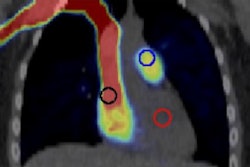
Many turn to electronic cigarettes as an aid to quit tobacco smoking, but new research shows that e-cigarette use has a significant association with periodontal disease, according to a first-of-its kind study published May 14 in the Journal of Dentistry.
While e-cigarette use is generally associated with a lower risk of periodontal disease, as well as lung and head and neck cancers, compared to conventional tobacco use, the prevalence of these diseases is still high in vapers. Previous studies have evaluated the relationship between smoking and periodontal disease, but the new research helps clarify the association between smoking status and periodontal disease.
"In our study, we observed a significant association between cigarette smokers and e-cigarette user groups with periodontal disease ... This association was high in both groups compared to the non-user group," wrote the authors, led by Lina AlQobaly of the University of Sheffield in the U.K. (J Dent, May 14, 2022, Vol. 122, e104164).
Assessing the relationship between periodontal disease and vaping
In the study, AlQobaly and her team aimed to assess the link between e-cigarettes and self-reported periodontal disease, with consideration as to whether conventional smoking status modified this association. The study was based on secondary data analysis of 8,129 participants of the U.S. National Health and Nutrition Survey that was conducted from 2015 to 2018.
Data about e-cigarette use and smoking status were collected through questionnaires. Adjustments were made for demographic factors, socioeconomic indicators, smoking status, diabetes, and dental visits in testing for associations. Additionally, smoking status was analyzed and considered.
Of the 8,129 study participants, 19.5% self-reported having periodontal disease, and 16.7% had been told by a dental professional that they have bone loss. The findings indicate that e-cigarette smoking was associated with self-reported periodontal disease, even after accounting for smoking status and other demographic factors. The findings align with previous studies that have reported significant and independent associations between e-cigarette smoking and periodontal disease.
E-cigarette users and former e-cigarette users are more likely to self-report perceived periodontal disease and bone loss compared to nonusers. While e-cigarette use is associated with self-reported periodontal disease, smoking status appears to explain the relationship between e-cigarette use and periodontal disease.
Aside from age and ethnic background, all study variables indicated significant differences between the self-reported periodontal disease group and the nonuser group. The group that self-reported having periodontal disease had a higher percentage of participants in the lowest education group and a higher percentage of participants with diabetes. Further, this group had a higher mean poverty income ratio. Regarding e-cigarette use, the group that self-reported having periodontal disease had a higher percentage of former and current e-cigarette smokers.
Is vaping a healthier alternative to tobacco cigarettes?
The effect of smoking on oral health is well documented, and the World Health Organization continually stresses the importance of quitting. Not only does smoking increase one's risk for developing oral diseases, but smoking can also interfere with periodontal disease therapeutic outcomes.
Clinical trials have previously demonstrated that e-cigarette smoking is an effective smoking cessation mechanism, especially compared to nicotine replacement therapy. However, toxins released from e-cigarettes increase one's risk of developing certain forms of cancer. In addition to the negative systemic health effect of e-cigarettes, research suggests a negative impact on oral health.
In this study, researchers observed a significant association between periodontal disease in both conventional and e-cigarette users compared to nonusers. However, the study also suggests that e-cigarette smoking is less harmful to oral health than conventional smoking.
Even though e-cigarette use was associated with periodontal disease, when the researchers analyzed smoking status, the association was only significant among current smokers. The findings indicate that smoking status explains the association between e-cigarette use and periodontal disease.
"Dental professionals should also comprehend that the potential benefits of quitting smoking outweigh the oral health harms from e-cigarette use based on the available evidence," the study authors concluded.



















